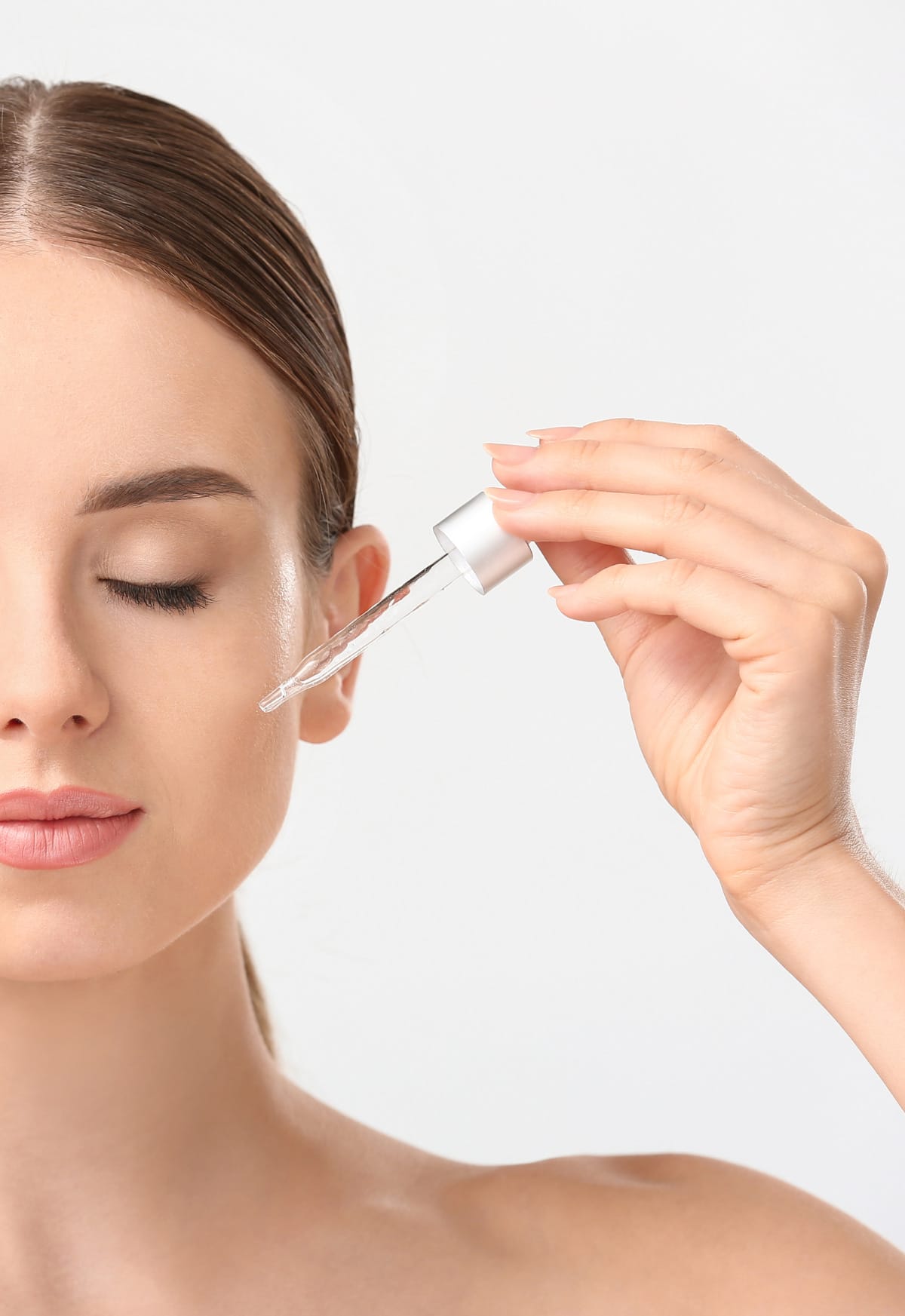
If you’re the type to keep up with skincare trends, you’ve recently encountered the buzzwords vitamin C and azelaic acid. These powerhouse ingredients have taken the skincare world by storm thanks to their potential to address various skin concerns.
While they’re commonly used to tackle acne, these acids aren’t just a one-trick pony. But have you wondered what these skincare superstars do for your skin?
Vitamin C, also known as ascorbic acid, is a potent antioxidant crucial in maintaining your skin’s health. It’s known for its ability to brighten, smooth, and firm the skin, gently exfoliating and reducing inflammation.
While lesser known, Azelaic Acid has powerful antibacterial, antioxidant, and exfoliating properties. It can significantly alter skin blemishes, discoloration, and scars caused by acne and help with skin texture. That’s why the beauty industry has found its benefits remarkable- and you could too!
Combining vitamin C and azelaic acid could give your skin the revitalizing boost it needs. Imagine the protective, brightening properties of vitamin C paired with the smoothing, tone-evening capabilities of azelaic acid.
It’s like an all-in-one solution to various skin concerns. Combined, their forces could provide a powerful cocktail to help you achieve the radiant, healthy skin you’ve always wanted.
But can it happen? Let’s explore the benefits of these wonder ingredients and how you can combine vitamin C and azelaic acid safely and effectively.
Understanding The Power of Vitamin C for Skin

What Is Vitamin C
Diving right in, let’s talk about Vitamin C. It’s no secret that this vibrant nutrient is a favorite in the skincare world. But why exactly? Vitamin C, or L-ascorbic acid, is the most abundant antioxidant on our skin.
However, its concentration gradually decreases as we age. Our bodies do not produce vitamin C – we solely depend on the amount we take from food. Yet it is unclear how effective oral vitamin C is for the skin. This is where topical vitamin C products come to the rescue!
Benefits Of Vitamin C
This magnificent ingredient can help your skin fight against free radicals – those pesky molecules that bring about premature aging. Essentially, it’s your skin’s trusty soldier, shielding it from environmental toxins and UV-induced damage.
Is there more to that? I hear you ask. You’ll be thrilled to know that vitamin C can do more than just defend. It acts as a brightener too! By inhibiting the enzyme tyrosinase, it suppresses melanin production, fading dark spots and giving your skin an even, glowing complexion.
So if you’re tired of dull skin, it’s definitely a game-changer. Vitamin C also boosts collagen and elastin synthesis. The result? Firmer, bouncier skin with fewer fine lines and wrinkles.
Vitamin C also boasts anti-inflammatory properties and has the prowess to replenish vitamin E on the skin – another potent antioxidant!
Here’s a quick round-up of the miraculous benefits of Vitamin C:
- Vitamin C is a powerful antioxidant that protects the skin from UV radiation.
- It boosts collagen synthesis and cross-linking, correcting acne scars and aging skin.
- It inhibits an enzyme of melanin production, resulting in a brighter and more even complexion.
- It replenishes vitamin E, another potent skin antioxidant.
- It boasts anti-inflammatory properties.
Who Should Use Vitamin C
Vitamin C’s benefits for the skin are no small matter. Yet, some skin concerns will benefit more from vitamin C than others; these are:
- Aging skin with the appearance of fine lines and wrinkles
- Photoaged skin
- Hyperpigmented skin with dark spots and uneven skin tone
Azelaic Acid: A Hidden Skin Care Gem
Are you struggling with spot-prone skin? You’re not alone. Azelaic acid might be the skin savior you’ve been searching for.
What Is Azelaic Acid
Azelaic acid is a naturally occurring acid found in grains such as wheat, barley, and rye. It’s also produced by the yeast that lives on human skin.
Azelaic acid can be found in various formulations of skincare products, including creams, gels, and foams. Although it is a natural ingredient, in these products, we find it in its synthetic form.
Despite its popularity, understanding the benefits and drawbacks of this ingredient can be confusing. But that’s why you are here!
What Are The Benefits Of Azelaic Acid
Azelaic acid performs a deep clean on your skin, sloughing away dead cells that often lead to spots and blackheads. This acid is a keratolytic agent promoting skin cell turnover.
Moreover, it’s known for its anti-inflammatory capabilities, easing redness and swelling often accompanying blemishes.
It’s also famous for its antioxidant, antimicrobial, and brightening properties, making it a popular choice for those dealing with conditions like acne, rosacea, and hyperpigmentation.
Quick Summary Of The Benefits Of Azelaic Acid In Skincare:
- Azelaic acid reduces inflammation, which may help with redness and irritation associated with acne and rosacea.
- It kills acne-causing bacteria on the skin’s surface, reducing the likelihood of breakouts.
- Thanks to its exfoliating properties, it removes dead skin cells and unclogs pores.
- It lightens dark spots and evens out skin tone, particularly for those suffering from post-inflammatory hyperpigmentation.
Who Should Use Azelaic Acid
Azelaic acid is an impressive all-around ingredient that can accommodate numerous skin concerns. So, who will benefit from azelaic acid?
- Acne-prone skin
- Inflammatory skin conditions like eczema or rosacea
- Uneven skin tone due to dark spots and hyperpigmentation
- Uneven skin texture
Combining Vitamin C and Azelaic Acid

Can You Use Vitamin C and Azelaic Acid Together?
The question is – can you harness the powers of both for your skincare routine? The resounding answer is YES! This dynamic duo can indeed be used together for a supercharged skin-boosting regimen.
Here’s a cool fact: Azelaic acid has a naturally low pH, matching the optimal pH of Vitamin C for absorption. So, not only can they sit well together on your skin, but Azelaic acid might even boost the efficiency of Vitamin C!
How To Use Vitamin C And Azelaic Acid
Combining vitamin C and azelaic acid is possible and beneficial for your skin’s health. However, one ground rule is to apply them at different times of the day. Vitamin C is best applied in the morning, while Azelaic Acid works well for night skincare routines.
Applying Vitamin C in the morning protects your skin from oxidative stress throughout the day.
Following up with Azelaic Acid at night can further improve skin texture and tone. Together, they work synergistically, enhancing each other’s benefits.
Also, concentrate on maintaining a balanced skincare regimen. Don’t overload your skin with too many active ingredients at once – remember, less is more.
Incorporating good sunscreen into your routine is paramount, as both Vitamin C and Azelaic Acid can make your skin more sensitive to the sun.
It’s also best if you introduce these ingredients separately into your routine. Ensure your skin gets used to the first ingredient, and then start incorporating the second.
Start with Vitamin C, let your skin adjust for a few weeks, and then move on to Azelaic Acid. This way, you’ll allow your skin to tolerate each ingredient without overlaying stress.
Precautions And Best Practices for Use
The old adage ‘less is more’ often rings true regarding skincare. Leveraging the power of Vitamin C and Azelaic Acid for skin health is no different.
There are some essential precautions and best practices to get the best out of these ingredients and avoid unnecessary irritation or damage to your skin.
Here are some key points to remember when using these two ingredients together:
- Always patch test on a small area of skin before full application.
- Start with low concentrations to avoid irritating your skin.
- Never mix vitamin C and azelaic acid.
- Instead of layering them, prefer using Vitamin C in the morning and Azelaic Acid in the evening to prevent irritation.
- ALWAYS wear sunscreen when paring these vitamin C and azelaic acid.
- Stay patient, as you might see noticeable changes after some time. Know that skincare ingredients like these take time to show results.
- Listen to your skin’s reactions and adjust your routine accordingly. Stop using these ingredients and contact a dermatologist if you notice any irritation.
Conclusion: The Final Verdict on Vitamin C and Azelaic Acid
That’s it! You’ve learned everything there is to know about two of the most popular ingredients in skincare and how you can combine them. Let’s do a quick recap of what we’ve learned about Vitamin C and Azelaic Acid.
Vitamin C, a powerful antioxidant, is essential for your skin’s health. It promotes collagen production, safeguards your skin against harmful ultraviolet rays, and brightens your complexion. Apart from its anti-aging capabilities, it also helps shield your skin from daily pollutants.
Azelaic Acid, on the other side, proves its prowess in treating mild to moderate acne. It has antibacterial properties that reduce the redness and swelling associated with acne. Plus, it breaks down dead skin cells, thus preventing pore blockages.
Together, they make great BFFs. Vitamin C and Azelaic Acid can be formidable allies in your skincare regimen. So why not reap the benefits of this power-packed duo? After all, the skin you care for today is the skin you’ll thank tomorrow!
Frequently Asked Questions
